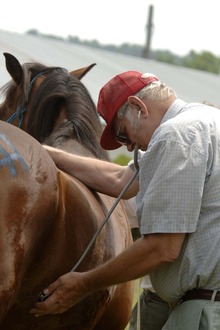According to veterinarians, preventative medicine is the most important aspect of equine care and should be a main priority for horse owners as the seasons change. Preventative medicine includes Spring and Fall vaccines, twice yearly physical exams, a dental exam and necessary treatment, fecal exams for internal parasites, and appropriate deworming strategies."

Veterinarian checking horse's health
Preventative medicine includes vaccines, a yearly physical and dental exam, fecal exams for internal parasites, and appropriate deworming strategies.
© 2016 by Carien Schippers
Reports show that while vaccines are an integral part of horse care, many horse owners either put off vaccinating their horses or do not vaccinat them at all.
Because of the failure to follow timely vaccine protocols, there has been an increase in the number of Eastern and Western equine encephalitis, Piroplasmosis, equine anemia and rabies cases across the country. Veterinarians are also seeing an increase in the number of horses with West Nile virus and tetanus.
These diseases can be deadly and every horse owner should follow the minimum recommended vaccines by the American Association of Equine Practitioners which are: Eastern and Western Encephalitis, Tetanus, West Nile Virus, and Rabies.
Equine dentistry is extremely important to the health of any horse. Yearly checkups are important to determine whether the horse's teeth need to be floated and to catch any dental problems before they lead to serious nutritional problems for the horse.
In addition, a yearly, or twice yearly, physical exam is a good opportunity to find problems before they become significant issues.
Last, but certainly not least, is parasite control. Although most horse owners deworm their own horses, a veterinarian provides a valuable service by examining fecal manure samples to determine a horse's level of infection and the efficacy of the present deworming strategy.
Over the years horse owners and veterinarians may have done too good a job of deworming horses. This has led to parasite resistence and if this continues there is the possibility of developing âsuper wormsâ which could be resistant to the dewormers available today.
If you are still deworming your horses on an every six to eight week basis it is time to revise your strategy.
As many veterinarians advise: The most important thing to remember is that the best way to treat a health problem with your horse is to keep it from happening to begin with.
